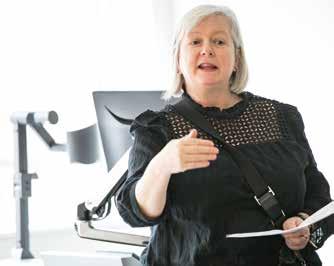
12 minute read
Early years excellence
Words by Sally Gillen Photos by Kois Miah
HUNDREDS of early years practitioners gathered at Birkbeck University’s east London campus for one of the biggest conferences in the sector, organised annually by nursery school head teachers.
The two-day event, Newham Nursery Schools Learning Without Limits, attracted about 600 educators from maintained nursery schools, private nurseries and nurseries in schools.
NEU member Nicola Hayden, an early years teacher of 35 years, head teacher and event organiser, told Educate: “It is really great to see so many here. It is so important that early years is valued.”
Lucille Samuel, nursery teacher at Odessa Infant School, added: “This is my third time at the conference. It is a really great way to refresh your thinking.”
Fierce spotlight on early years Keynote speaker Jan Dubiel, former nursery, reception and year 1 teacher, and an internationally recognised expert in early years practice, discussed why educators must refine their practice, challenge the many misunderstandings about what they do, and approach research with caution.
Early years practitioners have about 1,000 interactions with children every single day, each of which changes a child’s brain architecture, he said. “We often talk about early years teachers being like brain surgeons. The way you change children’s brains in the period in which you work with them is equivalent sometimes to a medical procedure. It’s that dramatic and that important.”
He added that the nature of very young children, their learning and the context they learn in is under “a very fierce spotlight in the educational establishment”, which is a good thing for a very misunderstood part of the sector.
“Early years is finally getting some of the status it deserves, but it’s obviously a doubleedged sword because if you don’t understand
young children and the nature of early learning that can skew policies,” Jan argued.
He pointed to a barrage of national initiatives and reports, particularly those that have been critical of reception practice because the understanding of early years is not what it should be. “Early years, perhaps more than any other sector, is subject to what you could describe as fads and gimmicks,” said Jan.
The audience laughed when he went on to say: “I had confidently predicted that Baseline

assessment would never become a national initiative because it was so unpopular.”
Reception Baseline assessment, which has been widely opposed by head teachers and discredited by research (see page 8), will be introduced across England in September.
Jan said there was often a kind of folklore – an “assumed approach” – about early years, which practitioners need to challenge.
But research, he said, should also be approached with caution. “We are constantly
(Clockwise from top right) head teacher and event organiser Nicola Hayden; nursery teacher Lucille Samuel, who was attending the conference for the third time; Alex Law, head teacher of Harry Roberts Nursery School, who ran a session on ‘What makes a quality story time?’; and keynote speaker Jan Dubiel


told that we need to work in an evidence-based context. That is absolutely right but we need to be critical consumers of research. We should never accept it at face value. We should look at things like sample size, how it was constructed and so on,” he said. “At best, research provides us with statistical likelihoods, not individual certainties… There are no answers to what we do other than getting to know your children, finding out what makes them tick.”
He advised practitioners to spend time
every day on the way home reflecting on one thing they have done that day, which, he said, will refine skill and intuition.
“Your intuition is one of the most powerful things you have. Intuition is directly connected to experiences, so the 1,000 interactions a day, a million interactions after three to four years, that is a massive well of experience that you continually draw on.”
Jan also urged educators not to conflate curriculum with pedagogy.
“Curriculum is quite dull – stuff children need to know. Pedagogy is the vehicle by which curriculum is delivered. We teach children what they need to know. Curriculums will always be contested because they are compromises. If you’re going to wait for the perfect curriculum you’re going to wait a lifetime,” he said.
Evidence, context and judgment Sarah Tillotson, programme manager at grantmaking charity the Education Endowment Foundation (EEF), outlined some of the work it does to close the education gap between the most and least disadvantaged children. EEF provides access to education research from around the world, generates new evidence, funds trials of innovative ideas, publishes guidance and provides training. “We want to make sure people access high-quality training and resist the fads that exist in education,” said Sarah. “We also understand that high-quality evidence can’t exist on its own. Any decisions made in schools need to happen in conjunction with context and professional judgment and those three things in a circle are the ‘intention’ aspect that Ofsted is asking for in its new inspection framework, along with implementation and impact.”
EEF is now looking at natural variation in practice between schools and teachers. For example, it is investigating whether asking children questions at the end of a story or throughout has the best impact on learning. Its website lists a number of promising, low-cost projects that have a significant impact. For example, the Nuffield Early Language Intervention, a programme designed to help young children with poor oral language to develop their vocabulary, narrative skills and chronological awareness, is listed.
NEU: fighting for nursery funding
THE annual Learning Without Limits conference is organised by leaders of maintained nursery schools (MNS) from across Newham, east London. “We are committed to celebrating the best of our work, and disseminating practice that strengthens outcomes for young children and their families, particularly the most disadvantaged,” said Nicola Hayden, head of Oliver Thomas Nursery School and Children’s Centre. The 392 maintained nurseries are chronically underfunded. Stopgap funding announced before the General Election runs out in 2021.
Tens of thousands of people have signed a petition demanding the Government act to secure their longterm future, which will be handed into 10 Downing St on 2 March. n Find out more at neu.org.uk/ save-nursery-schools


Iceland & Northern Isles Cruise 12 nights from £1079pp

SAVE UP TO 45%
Voyage to the Land of Fire & Ice this Summer
Columbus sails 9th August 2020 Adult-Only Cruise Ship No fl ying Involved - Sailing from UK Sterling Currency On board
The impressive Columbus • Traditional British cruise experience • Mid-sized ship, carrying about 1400 guests • Friendly and attentive service • Four restaurants, alfresco grill and coffee shop • A wide choice of comfortable lounges • Spacious well-appointed cabins & suites • Expansive sun decks, two pools & Whirlpools • Shows, cabarets, and guest speakers • Fully equipped gym and spa • Card room, casino, crafters studio and library
Whats included in your fare • Delicious full board cuisine • Afternoon teas and late night snacks • Captain’s Cocktail Party • Self service tea & coffee (6am to midnight) • Big show entertainment, cabarets and classical interludes • Daytime activities and leisure facilities • Guest speaker and arts & crafts • Porterage of luggage, port to cabin • Port Taxes
Overview
Home to one of the world’s most dynamic landscapes, Iceland is the legendary ‘Land of Fire and Ice’! Vast ice caps, active volcanoes, spouting geysers, bubbling mud pools and geothermal hot springs are all part of the exciting nature you may experience on this extraordinary island. Visits to Rotterdam, the beautiful Orkney Islands and the remote Faroes complete this very special cruise.

Itinerary

London Tilbury - Rotterdam (Netherlands) - Kirkwall (Orkney Islands) - Tórshavn (Faroes) - Seyðisfjorður (Iceland) - Akureyri (Iceland) - Ísafjörður (Iceland) - Reykjavík (Iceland) - London Tilbury.
Cruise Highlights

• Spouting geysers, gushing waterfalls and bubbling mud pools are all part of the classic ‘Golden Circle’ tour from Iceland’s charming charming capital Reykjavík. • Experience Iceland’s most iconic health spa and bathe in the Blue Lagoon, where geothermal seawater offers a relaxing experience. • Admire the spectacular scenery of the Isafjord, which is home to a huge array of Icelandic wildlife such as the arctic fox and seals. • The beautiful crescent shape Godafoss, ‘Waterfall of the Gods’, obtained its name when the chieftain, Thorgeir, made a declaration in favour of Christianity by throwing his carvings of the pagen Norse Gods into the falls.

• Enjoy one of the smallest remote capitals in the world - Tórshavn, in the remote Faroe Islands. Just 18,000 inhabit the modern town, gateway to beatiful Streymoy Island.
Fares
Accommodation (twin) Full Fare pp Saver Fare pp JS. Junior Balcony Suite £6259 £3449
DL. De Luxe Balcony 12. Premium
11. Superior Plus
9. Superior
8. Standard Plus
7. Standard
6. Standard
Voyager^ Outer
4. Premium Inner
3. Superior Inner
2. Standard Plus Inner
Voyager^ Inner
Singles
10. Superior Outer
5. Superior Inner
£5559 £3059
£3889 £2139
£3619 £1999
£3339 £1839
£2989 £1649
£2849 £1569
£2779 £1529
£2489 £1369
£2509 £1379
£2369 £1309
£2229 £1229
£1959 £1079
£4169 £2299
£2959 £1629
LEGISLATION has been in place in the UK for years to ensure that women are not treated unfairly in the workplace because of pregnancy and maternity.
Despite this, many women report being dismissed, demoted, denied training or promotion or feel bullied into leaving their jobs, purely because they became pregnant.
Over recent months, the union has dealt with a significant number of cases on behalf of pregnant members and those on maternity leave. In this Ask the union special, the head of the NEU’s employment rights unit Jayne Phillips examines how we resolved these cases.
How widespread is pregnancy and maternity-related discrimination? Government research into pregnancy and maternity-related discrimination in 2015 found that each year 54,000 women lose their jobs as a result of their pregnancy and that 77 per cent of pregnant women and new mothers experience negative treatment.
What does the law say? It is unlawful to dismiss a woman from her job for a reason connected to her pregnancy, maternity or maternity leave.
Pregnant women and those on maternity leave are also protected from unfair treatment, for example being denied promotion. Of course, the problem is that this poor treatment occurs at a time when the new or expectant mother wants to focus on her baby’s wellbeing. Having a difficult time at work also means that for women a time of joy is tainted by stress and upset. It is therefore not uncommon for this bad treatment to go unchallenged.
What happens if you are made redundant while on maternity leave? A member at an independent school contacted the union when she was made redundant while on maternity leave.
Regulations provide that a woman on maternity leave must be offered any suitable vacancy if her post becomes redundant when she is on maternity leave. In this case, the employer argued that this did not apply as the new role created in the restructure was filled before our member was selected for redundancy. We disagreed and employment tribunal proceedings were issued. The employer subsequently agreed to settle the claim, paying our member a significant amount of compensation and providing a written apology.
What if I am victimised over my pregnancy? In another independent school, a member was told that she was to be disciplined due to sickness absence. Her absences were mainly pregnancy related. Unfortunately, the employer’s threats caused our member additional stress and she was signed off as unfit to work until her maternity leave began.
When her baby was born the employer did not make a congratulatory announcement but did so for another colleague who had recently given birth. The NEU argued that this failure was caused by the member raising a complaint of discriminatory treatment and so was victimisation. There were other instances of unfair treatment that while by themselves did not seem serious, added to our member feeling left out, isolated and upset.
After employment tribunal proceedings were issued the employer agreed a package of compensation and our member left her job, feeling unable to return.
Should I still be considered for promotion? Yes. The union sees a significant number of cases where pregnant employees, or those on maternity leave, are overlooked for promotion. If the member feels able to return to work, we have been able to ensure that the promotion is given; or a compensation

package is negotiated if the member would prefer to leave.
If I’m pregnant, do I need a risk assessment? Employers are required to assess any risks in the workplace which might be posed to a new or expectant mother. This may include the risk of physical assault by a pupil or the exposure to chemicals in a science lab.
What antenatal and parental leave am I entitled to? A pregnant employee must not be unreasonably refused time off during her working hours to attend an antenatal appointment with her GP, registered midwife or registered health visitor. Partners of pregnant employees also have limited rights to unpaid time off to attend appointments. People who are adopting a child enjoy similar rights and, since 2015, the partners of new mothers can replace maternity leave with Shared Parental Leave.
From April 2020, parents who lose a child are entitled to two weeks’ bereavement leave. n Visit neu.org.uk/advice/maternity-rights n Contact the AdviceLine neu.org.uk/ employment-adviceline
Please write Send your queries to: Ask the union, Educate, NEU, Hamilton House, Mabledon Place, London WC1H 9BD or email educate@neu.org.uk










